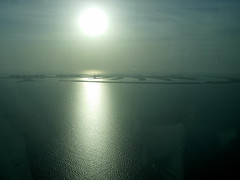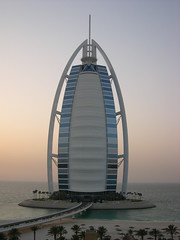Guest Blogger: Sheridan on Dubai Between Oil and Consumerism
Irish blogger Gavin Sheridan was moved by the recent death of Dubai emir Sheikh Maktoum to comment on the situation of the emirate, which he visits often.
Gavin kindly writes:
” ‘History Rising’ says the massive billboard as you ride along in a taxi on Sheikh Zayed Road in the small Emirate city of Dubai. It is quite an apt description not just of the building project it describes, but of the entire Emirate itself.
Dubai, more so than any other of the Emirates in the United Arab Emirates, has undergone a dramatic transformation. And the pace of change appears to be increasing – in my visits to Dubai in the last 4 years I have seen the construction and completion of immense building projects – and the biggest have yet to be finished.
If I was to imagine a democratic, wealthy and successful Iraq, I would look at some of what Dubai has achieved and replicate it. Dubai does have issues, most of them related to democratic freedoms and censorship, and in many ways it is a place of contradictions – on the face of it a Western-style economy, tourism, oil exports, Western-style architecture and lifestyle, shopping malls and water-parks. But on the other side a less than free press, a king, a censored Internet, some exceptionally strict laws and punishments and ill-treatment of immigrant workers.
But if Iraq were to replicate some of what Dubai has done, it would be a highly successful and dynamic economy within a few decades – with its oil wealth being used to achieve a vibrant and open economy.
Reading a list of projects currently underway in Dubai is somewhat mind boggling, but it serves to show the appetite there for development and status.
The Burj Dubai (Dubai Tower) is currently under construction and is expected to be completed in 2008. Looking at it in December it seemed to be a good 30 floors up, out of the planned 124 floors. The figure for its exact height will not be released until completion but it is thought to be about 2,300 feet – making it the tallest structure in the world. But the Burj Dubai is not being built in isolation. Surrounding will be a multitude of other developments known as the Business Bay, where half a dozen skyscrapers are already completed. Some others are planned with interesting designs.
The other major developments are the artificial islands being built off the coast of Dubai. These are exceptionally large developments – increasing the length of Dubai’s coastline by a number of factors.
There are currently 4 major islands being built, Palm Island Jumeirah is the most advanced in construction, with Palm Island Jebel Ali, Palm Island Deira and ‘The World‘ also under construction. All are shaped like palm trees, while the World is a network of islands designed to look like the world.
All of the property on these islands has sold, or will be up for sale – for premium prices as one might expect.
The iconic Burj al-Arab has become the icon of Dubai, and is often the symbol used on number plates for cars (many expensive ones like this). It is thought to be one of the tallest and most expensive hotels in the world.
Dubai Marina is, to me at least, a prime example of just what happens in Dubai. When I visited Dubai for the first time in December 2001, Dubai Marina was nothing more than a piece of desert. I found it odd to find, along the road to Abu Dhabi, a lone restaurant – a Hard Rock Café – entirely alone in the desert. 4 years later and it is surrounded by up to 25 completed gleaming skyscrapers – housing tens of thousands of people. It is testament to the work regime imposed on the immigrant workers – mostly from the sub-continent.
The average construction worker is either Pakistani or Indian, works 12 hours a day in up to 50 degrees Celsius (122 Fahrenheit), 6 days a week. He is paid about $150 a month for his effort.
Westerners – usually British, Irish, South African or Australian – work in the skilled sectors: engineers, surveyors, teachers or managers. And there are plenty of Western companies based there, among them Microsoft, Oracle, HP, IBM, Compaq, Dell, Siemens, Canon, Logica, Sony Ericsson and Cisco.
Dubai, as an Emirate in itself, will run out of oil within two decades (the rest of the UAE has an estimated 100 years left), and because of that it is gearing itself for tourism. Last year it made more money from tourism than it did from oil – thanks to it’s weather, its liberal attitude to alcohol consumption, fine restaurants, luxury hotels and massive shopping malls. The recently opened Mall of the Emirates boasts what it claims to be the largest mall outside of North America, and the third largest in the world – and includes the only artificial ski resort in the Middle East. These malls include most designer names that one could think of – other shopping malls compete with it, but while smaller remain impressive – City Center, Mercato, Burjuman and more. DubaiLand , a theme park, is also planned, not far from the site of the Burj Dubai.
Dubai is a city that changes at an incredible rate, in one area alone I counted over 100 construction cranes, in 14 months since I last visited there, over a dozen skyscrapers have appeared out of nowhere, while more than further 40 are under construction.
But can it last?”





 © 2025 All Rights Reserved
© 2025 All Rights Reserved